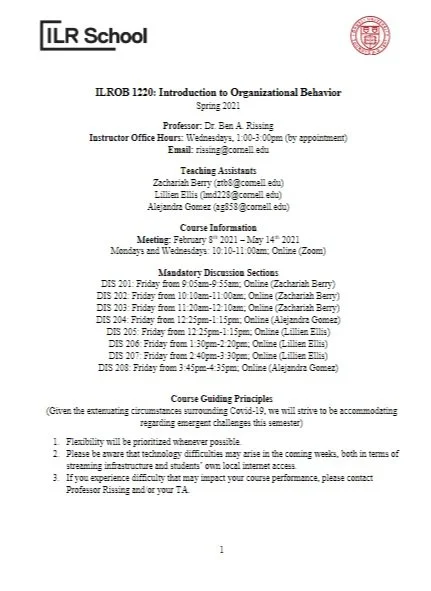Introduction to Organizational Behavior
(ILROB 1220)
-
ILROB 1220 is a required course for Cornell ILR School students that spans broad organizational behavior (OB) topics. Theories in this area examine how individuals, groups, and organizations interact, drawing primarily from arguments in sociology, psychology, economics, and management. The first month of the class primarily explores individual-level processes, including hiring and selection, diversity and bias, worker motivation, and job satisfaction. The second month focuses on groups and teams, including group-level decision making, conflict and negotiation, influence, persuasion, and leadership. The final section of the class adopts an organizational-level perspective. These classes assess formal structure, social networks, organizational culture, organizational change, and external environmental factors shaping the competitive success of firms.
Social Capital and Organizations
(ILROB 3270)
-
This class introduces students to prominent theories pertaining to social relationships, which may shape key labor market outcomes. The course is divided into three sections, each focusing on different levels of analysis: 1) individuals, 2) organizations, and 3) markets. The first section introduces students to foundational sociological theories pertaining to how social relationships between friends, family, co-workers, and acquaintances may impact outcomes in employment settings, notably including information flows and offers of support. The second section takes an organizational perspective to explore how firms may realize superior hiring outcomes, greater employee performance, and reduced attrition by engaging workers’ social connections. The final section explores how socially-constructed features of markets may impact critical outcomes, including the role of audiences, categories, status, diffusion, adoption, and delusion. The course closes with a discussion of the risks and limitations inherent in modern digital communities resulting from emergent privacy considerations and mass surveillance.
Stratification and Labor Markets
(ILROB 4250)
-
This class introduces students to prominent labor market inequality and wealth stratification theories. The course initially introduces students to key sociological theories addressing the role of organizations in shaping income distributions and access to employment opportunities. Readings overview major arguments explaining different forms of discrimination in hiring and compensation decisions. Structural factors within (and outside of) employers’ control that may shape labor market outcomes are also discussed. Next, the course explores the role of individuals and society in shaping labor market stratification. Readings analyze social processes that may shape access to desirable job opportunities among different groups of workers, including psychological factors, sex-segregated occupations, regional clustering, and the flow of job-relevant information through social connections, among others. Finally, the course assesses stratification at a global level. Readings examine the effects of technology and globalization on income inequality. The international movement of money, people, and jobs is also discussed. This section closes with a discussion of capital and wealth accumulation in the United States and abroad. Potential policy remedies are detailed.
Employment and Labor in the New Economy
(ILROB 3750)
-
This course examines classical and contemporary theories pertaining to work, employment, and labor markets. Readings and class discussions focus on individuals’ careers and organizations’ employment processes including: labor market dynamics, characteristics of the new economy, formal and informal job search, and technology-enabled hiring assessments (involving, for instance, resume keyword screens, applicant pre-testing, and passive data collection). Key theories are studied in the context of high-profile organizational settings. Initially, the course introduces students to classic models relating to the functioning of labor markets, the division of labor, and the meaning of work. Next, we discuss employment and careers in the new economy, including increased mobility among jobs, more diffuse employment relationships, and a weakening of firm boundaries. Readings address the emergence of new types of employment relationships and functional parallels with early conceptions of work. The course closes with an explicit focus on the career decisions of individuals and human resource tools within organizations that have emerged in response to emergent structural and social considerations in the new economy.



